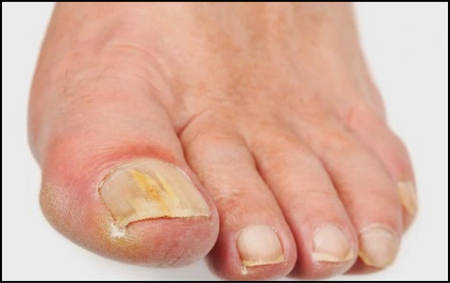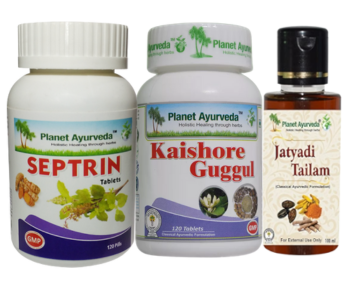AYURVEDIC REMEDIES AND NATURAL TREATMENT FOR PARONYCHIA
ABSTRACT
Nails are frequently regarded as unimportant and a symbol of beauty. For the human body, they play a considerably more significant function. Although nails have many uses, they are prone to infections and damage. If neglected, these infections seriously harm the underlying skin and nails. Bacteria are the most common cause of paronychia (nail infection). Most nail infections can be cured with antibiotics. Paronychia typically does not result in significant health issues. Sometimes the infection could come back or last a long time even after treatment. In this article, we discuss Paronychia in detail.

INTRODUCTION OF PARONYCHIA
Nails have many uses, so they are prone to infections and damage. Injury, irritability, or infection can all result in paronychia, or nail inflammation. Fingernails or toenails could be affected. An illness known as paronychia can happen when microbes invade injured skin close to the cuticle and nail fold. The skin at the base of the nail is known as the cuticle. The nail fold is the point where the epidermis and nail meet.
TYPES OF PARONYCHIA
- Acute Paronychia: Acute paronychia symptoms can start to show up within a few hours or days. The infection is contained in the fold of the nail and does not penetrate farther into the finger or toe. With treatment, symptoms disappear and do not last more than six weeks.
- Chronic Paronychia: The symptoms take longer to manifest than those of acute paronychia and typically continue for six weeks or longer. A single infection might spread to several fingers or toes. Along with the bacterial infection, there is a nail fungus. One of the many fungi that can infect your toenails is Candida.
CAUSES OF PARONYCHIA
Infectious paronychia most frequently results from a staph infection. Staph infections are brought on by Staphylococcus aureus bacteria. The illness can also be brought on by other bacteria, like Streptococcus pyogenes. Bacteria enter the skin through hangnails, cuts, and broken skin.
- Ingrown toenails are the most common cause of ingrown nails.
- Irritation caused by chemicals or water
- Injury to the cuticle or nail bed.
- Accidents
- Nail-biting
- Getting regular manicures and pedicures can cause trauma.
- Several drugs can lead to paronychia, like retinoids, anti-cancer drugs, HIV drugs, and certain antibiotics.
SYMPTOMS OF PARONYCHIA
- Pain around the nails
- Swelling around the nails
- Tenderness around the nails
- Red skin and warm to the touch
- Pus that accumulates beneath the skin
- A pus-filled abscess that ranges in colour from white to yellow could develop. If an abscess develops, antibiotics and drainage can be necessary.
DIAGNOSIS OF PARONYCHIA
- Medical history
- Physical examination
- Sample of pus from the infection
- Swab for Gram stain, culture, and sensitivity.
- X-ray
- Biopsy of skin or bone
TREATMENT OF PARONYCHIA
The aetiology and degree of paronychia determine the appropriate course of treatment. The therapies that are employed most frequently include:
- Antibiotics for bacterial infections
- Antifungal medications for fungal infection
- Pus drainage in abscess instances
- Surgical nail-part removal (in extreme cases)
PREVENTIONS OF PARONYCHIA
- Do not bite your nails.
- Avoid trimming the nails too short.
- Avoid trimming too closely to the fold of the nail.
- Handwashing helps maintain hygiene
- Lubricate the nail folds with lotion
- When working with chemicals, wear waterproof gloves
AYURVEDIC ASPECT OF PARONYCHIA
नखमांसमधिष्ठाय पितं वातश्च वेदनाम। करोति दाहपाकौ च तं व्याधिं चिप्पमादिशेत।। तदेव क्षतरोगाख्यं तथोपनखमित्यपि।। (सु. नि. १३/१९-२०)
Nails are generated during Tritiya Avastha Paak, the third digestive phase, and are regarded in Ayurveda as a bone substance (Asthi Dhatu). According to Acharya Sushruta, paronychia is correlated with chipp. It is a pitta dominant tridoshaj vyadhi. It is also known as shatroga and upnakh. This issue affects hospital staff, cleaners, and washers. Various herbal remedies and oils are mentioned in Ayurveda as treatments for paronychia.
HERBAL REMEDIES FOR PARONYCHIA BY PLANET AYURVEDA
Planet Ayurveda is a GMP-certified Ayurvedic clinic that creates a variety of herbal treatments for the treatment of those who are ill as well as the prevention of various health problems. Every formulation created by Planet Ayurveda is free from any kind of resin, colour, or ingredient. These treatments are completely natural and were created under the supervision of M.D. Ayurvedic doctors, and the formulations had no negative side effects. Planet Ayurveda offers a variety of herbal remedies for the treatment of Paronychia that we will discuss further in this article in detail.


PRODUCT LIST
- Kaishore Guggul
- Septrin Tablets
- Septrin Tablets
PRODUCT DESCRIPTION
1. KAISHORE GUGGUL
Kaishore guggul is a multi-herbal formulation that is formulated by Planet Ayurveda with the help of Piper longum (Long pepper), Vidanga (Embelia ribes), Zingiber officinale (Ginger), Black pepper (Piper nigrum), Guduchi herb (Tinospora cordifolia), and some other ingredients. It is a herbal remedy with antimicrobial and antibacterial properties. It helps with urinary tract infections. It is also an antioxidant, a restorative tonic, an immunomodulator, and a rejuvenator. It is a wound healer and also helps in the healing of ulcers.Dosage: Take 2 tablets twice a day.
2. SEPTRIN TABLETS
Spetrin tablets are multi-herbal tablets that are formulated by Planet Ayurveda with the help of Commiphora mukul (Guggul), Haldi (Curcuma longa), Ocimum sanctum (Tulsi), Sonth (Zingiber officinale), Piper nigrum (Marich), and Pippali (Piper longum). It balances tridosha (vata, pitta, and kapha doshas). It helps with urinary tract infections, respiratory tract infections, and ear infections. The human body is the target of a variety of these effects. It contains blood-purifying, antimicrobial, anthelmintic, anti-inflammatory, and other effects. It is recommended for people with headaches, tension, bronchitis, asthma, and fever.
Dosage: Take 2 tablets twice a day.
3. JATYADI TAILAM
Jatyadi Tailam is a multi-herbal formulation that is formulated by Planet Ayurveda with the help of Jasminum Officinale (Chameli), Neem (Azadirachta indica), Beeswax (Madhuchchhisht), Berberis aristata (Daruharidra), Lodhra (Symplocos racemosus), Karanj beej (Pongamia pinnata), and some other ingredients. These herbs are all anti-inflammatory and have skin-healing qualities. Jatyadi oil is combined with Dashang lepa and Kushta rakshasa oil and then applied to the diseased area.
Application: Locally applied to affected areas.
CONCLUSION
Nails are frequently regarded as unimportant and a symbol of beauty. For the human body, they play a considerably more significant function. Although nails have many uses, they are prone to infections and damage. Injury, irritability, or infection can all result in paronychia, or nail inflammation. Fingernails or toenails could be affected. An illness known as paronychia can happen when microbes invade injured skin close to the cuticle and nail fold. Nails are generated during Tritiya Avastha Paak, the third digestive phase, and are regarded in Ayurveda as a bone substance (Asthi Dhatu). According to Acharya Sushruta, paronychia is correlated with chipp. It is a pitta-dominant tridoshaj vyadhi. It is also known as shatroga and upnakh. In Planet Ayurveda, there are some herbal remedies that are beneficial for Paronychia without causing any side effects.
Dr. Vikram Chauhan
Latest posts by Dr. Vikram Chauhan (see all)
- Best and Safest Natural Product for Fatty Liver - November 25, 2024
- How To Manage Advanced Stage of Ulcerative Colitis With Ayurveda? - November 9, 2024
- How The Liver Is Connected With Metabolism, Digestion, And Weight Management - October 23, 2024
- Chemotherapy And Ayurvedic Treatment For Cancer - October 18, 2024
- Natural Ayurvedic Treatment For Psoriasis With Herbal Remedies - October 7, 2024




